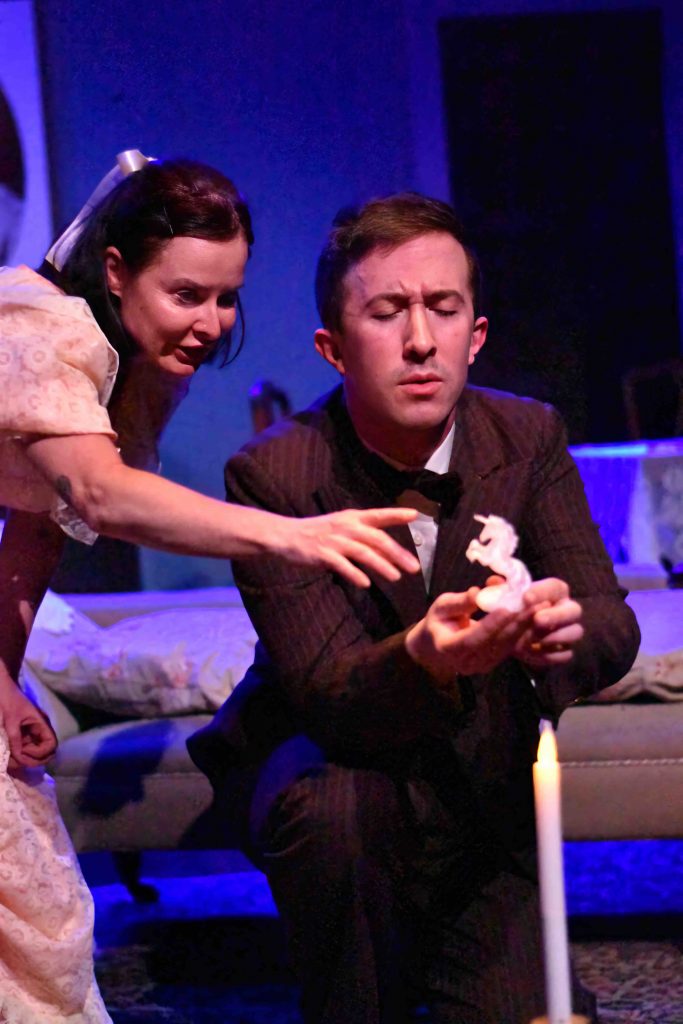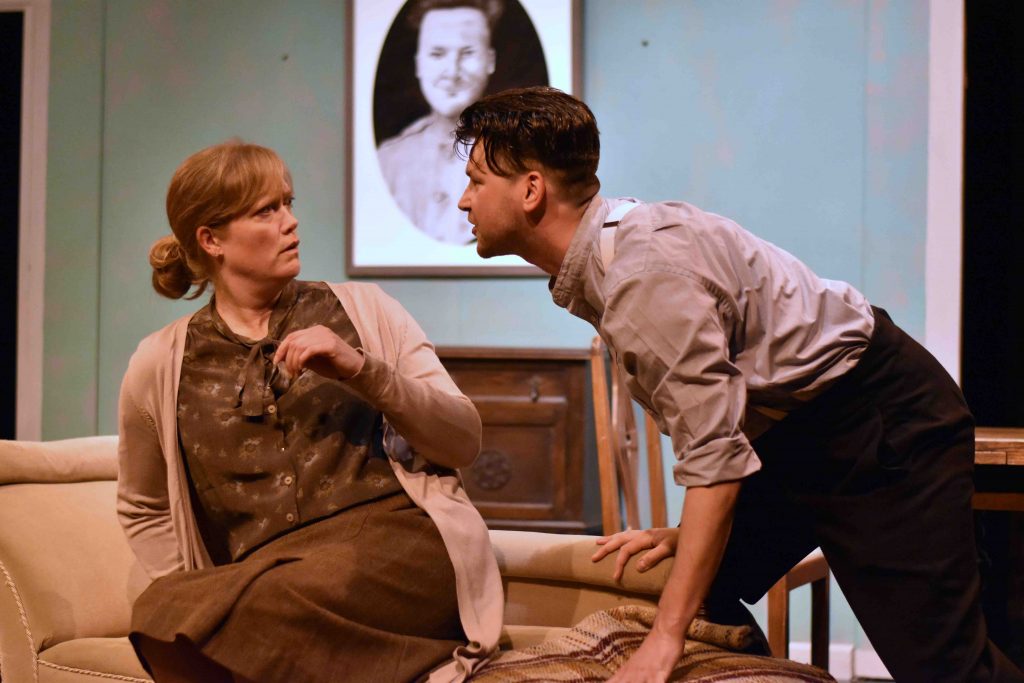The Glass Menagerie may well be one of the most popular of 20th century American plays, but it stands or falls as much on the ability of its four strong cast to be convincing in their roles as Tennessee Williams’ writing.
In the hands of Everyman’s director Rob Phillips, this is achieved with an accomplished ensemble of players who each give finely drawn characterisations.
Victoria Walters and Owain Miller
Ellie Hoare and Michael Taylor Moran
Amanda Wingfield is a fading, and frustrated, Southern belle from Blue Mountain, Mississippi, who has been abandoned by her husband and struggles to raise her two challenging children. Son Tom works at a shoe warehouse but wants to be a poet, escapes reality by going to the movies and wants to shake off the responsibility of his overbearing mother and crippled, painfully timid, and insecure sister. Daughter Laura too escapes the reality of her fragile world by collecting the glass animals.
For the mother the only route to salvation is for a gentleman caller to marry Laura, and bullies Tom to invite someone from work to dinner. It turns out to be Jim O’Connor who was at school with the two children and had not only been the golden student in every area but Laura’s schoolgirl obsession. His life has come to nothing, but he is trying to improve himself. It transpires Jim is engaged (or at least says he is), Laura is crushed, Amanda sinks into despair, and Tom follows his father’s example and abandons them. The ending monologue is how he can never really escape and sees his sister’s glass menagerie in the coloured glass perfume bottle of store windows and feels her hand on his shoulder.
Ellie Hoare plays Amanda with a subtle balance of power and of her own fragility. Yes, she is domineering, somewhat deluded, but desperate that she can survive and find some form of success through her own children. However, as a mother she also wants what she thinks is best for her children, particularly as she can see Tom turning into his father.
She is as fragile as her daughter but able to put up a screen of confidence. It might sound an odd comparison but even without the accent she can be seen in Blanche from the Golden Girls. She wants gentleman callers to stop Laura becoming an old spinster, but also relishes the opportunity to flaunt her own southern charms. Ellie Hoare gives a powerful performance from start to finish.
As Tom, Michael Taylor Moran draws you into his world of yearning and skilfully displays the character’s balance between responsibility and yearning. He is his father’s son, and he knows it. Do we like the character? I doubt that was either the actor or the playwright’s intention. Rather, we sympathise with his predicament and feel his pain, and his cowardice.
Poor Laura. What a wonderful performance by Victoria Walters. Emotionally draining to watch, I even heard myself say Oh No when her gentleman caller tells her he is engaged, so utterly transfixing was her performance. You could feel her pain, her nervous collapses, her childlike joy with her animals, the minutes of bliss when she thinks her hero likes her. Then the total collapse when he pulls that rug from under her feet, almost literally.
Jim only appears in the second half, when the gentleman caller finally comes to supper, which is perfect as he is like the unintentional wrecking ball that shatters the illusion of the southern charm dinner party, breaks Laura’s favourite unicorn, and her heart, along with her mother’s self-delusions. Owain Miller plays him as another fractured soul, but one who seems to have persuaded himself that he can escape his own weaknesses through self-improvement. This is sort of attitude Amanda has tried to force on Tom. Will he? His psychoanalysis of Laura is spot on but then he commits the most heinous of all of the crimes against her, raising her up only to kick her straight back down. If ever there was a case study of why you should not interfere in someone else’s life when you are going to walk away, this is it.
The fifth character is the absent father whose face grins out at us all from a huge portrait on the wall. He indeed bears a resemblance to Tom and also Laura somehow.
The setting is largely immaterial, such is the power of these performances, but we have a flexible staging. A table sits in the corner for the supper party, while a chaise and chair and assorted furniture forms the parlour. Two doorways into brick lined rooms at the back are the rest of the house, while a porch/ fire escape stairway, is used for the famous prologue and then epilogue. It is also from where the lights and music from that outside world music hall sneak into the suffocating Wingfield tomb.
This is fine, rich acting, deftly directed resulting in a deeply satisfying evening of theatre.
Chapter, Cardiff.
Until Saturday, May 11.
Images by Cressida Ford
There is an extensive Everyman festival in Cardiff this summer: https://cardiffopenairtheatrefestival.co.uk/

